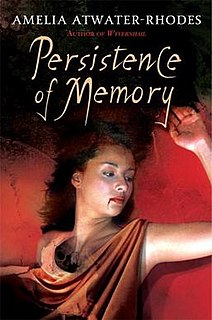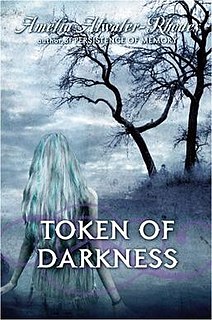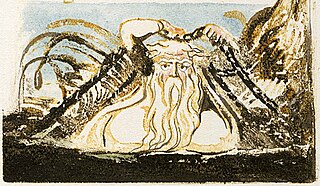See also
- Fruit of the poisonous tree, a legal metaphor used to describe evidence that is obtained illegally
Poison Tree may refer to:

Persistence of Memory is the tenth novel by American teen author Amelia Atwater-Rhodes and is the fifth novel in her Den of Shadows series. Published on December 9, 2008 the novel tells the story of Erin Misrahe and her struggles with her alter-ego Shevaun, who is in fact a vampire with whom Erin has a link. The novel also mentions a character from Atwater-Rhodes's previous novel, In the Forests of the Night (1999), Alexander, the brother of the protagonist, Risika. The poem by Edgar Allan Poe entitled "A Dream Within a Dream" is featured in the novel.

Songs of Innocence and of Experience is a collection of illustrated poems by William Blake. It appeared in two phases: a few first copies were printed and illuminated by Blake himself in 1789; five years later he bound these poems with a set of new poems in a volume titled Songs of Innocence and of Experience Shewing the Two Contrary States of the Human Soul. Blake was also a painter before the creation of Songs of Innocence and Experience and had painted such subjects as Oberon, Titania, and Puck dancing with fairies.
Amelia Holt Atwater-Rhodes, known professionally as Amelia Atwater-Rhodes, is an American author of fantasy and young adult literature and a Language Arts/Literature teacher at Learning Prep School in West Newton, MA.

In the Forests of the Night is a vampire novel written by Amelia Atwater-Rhodes, and published in 1999. It was originally entitled White Wine. Atwater-Rhodes wrote it at the age of thirteen, but it was published on May 11, 1999, about a month after she turned fifteen. It is the first novel in the Den of Shadows series. It tells the story of a three-hundred-year-old vampire named Risika and her struggles throughout her life, both before and after she was turned into a vampire. The novel is told in first-person narrative by the protagonist, Risika. It was well-received by critics.

The Lilly is a poem written by the English poet William Blake. It was published as part of his collection Songs of Experience in 1794.

"A Poison Tree" is a poem written by William Blake, published in 1794 as part of his Songs of Experience collection. It describes the narrator's repressed feelings of anger towards an individual, emotions which eventually lead to murder. The poem explores themes of indignation, revenge, and more generally the fallen state of mankind.

William Blake's body of work has influenced countless writers, poets and painters, and his legacy is often apparent in modern popular culture. His artistic endeavours, which included songwriting in addition to writing, etching and painting, often espoused a sexual and imaginative freedom that has made him a uniquely influential figure, especially since the 1960s. After Shakespeare, far more than any other canonical writer, his songs have been set and adapted by popular musicians including U2, Jah Wobble, Tangerine Dream, Bruce Dickinson and Ulver. Folk musicians, such as M. Ward, have adapted or incorporated portions of his work in their music, and figures such as Bob Dylan, Alasdair Gray and Allen Ginsberg have been influenced by him. The genre of the graphic novel traces its origins to Blake's etched songs and Prophetic Books, as does the genre of fantasy art.
The Garden of Earthly Delights is a painting by Hieronymus Bosch.
Den of Shadows, is a set of fantasy novels written by American author, Amelia Atwater-Rhodes. The novels follow an interconnected group of supernatural creatures, such as vampires, ghosts, and shapeshifters. It is the predecessor of Atwater-Rhodes' five volume series, known as The Kiesha'ra Series.

Token of Darkness is the eleventh novel by American author, Amelia Atwater-Rhodes and is the sixth novel in the Den of Shadows. The novel was published on February 9, 2010. "The Raven" by Edgar Allan Poe is featured in the book.

Poison Tree is a 2012 young adult fiction novel by American author Amelia Atwater-Rhodes and is her thirteenth novel. The book was published on July 10, 2012 and is the eighth novel in the Den of Shadows series. The novel's title is derived from a poem by William Blake entitled "A Poison Tree", which is featured at the beginning of the novel. Atwater-Rhodes stated that Poison Tree was originally titled Tiger Rise, that she had initially filmed it as a movie with her friends, and that the book took her a long time to write.
"The Fly" is a poem written by the English poet William Blake. It was published as part of his collection Songs of Experience in 1794.

"The Human Abstract" is a poem written by the English poet William Blake. It was published as part of his collection Songs of Experience in 1794. The poem was originally drafted in Blake's notebook and was later revised for as part of publication in Songs of Experience. Critics of the poem have noted it as demonstrative of Blake's metaphysical poetry and its emphasis on the tension between the human and the divine.
The Human Abstract may refer to:

Introduction to the Songs of Experience is a poem written by the English poet William Blake. It was etched and published as part of his collection Songs of Innocence and of Experience in 1794.

The Voice of the Ancient Bard is a poem written by the English poet William Blake. It was published as part of his collection Songs of Innocence in 1789, but later moved to Songs of Experience, the second part of the larger collection Songs of Innocence and of Experience, 1794.
Songs of Innocence is an illustrated collection of poems by William Blake, the first book of two in Songs of Innocence and Experience.

"The School Boy" is a 1789 poem by William Blake and published as a part of his poetry collection entitled Songs of Experience. These poems were later added with Blake's Songs of Innocence to create the entire collection entitled "Songs of Innocence and of Experience Shewing the Two Contrary States of the Human Soul". This collection included poems such as "The Tyger", "The Little Boy Lost", "Infant Joy" and "The Shepherd". These poems are illustrated with colorful artwork created by Blake first in 1789. The first printing in 1789 consisted of sixteen copies. None of the copies of Songs of Innocence are exactly alike as some of them are incomplete or were colored in posthumously "in imitation of" other copies.
Songs and Proverbs of William Blake is a song cycle composed by Benjamin Britten (1913–76) in 1965 for baritone voice and piano and published as his Op. 74. The published score states that the words were "selected by Peter Pears" from Proverbs of Hell, Auguries of Innocence and Songs of Experience by William Blake (1757–1827). It was premiered at the Aldeburgh Festival in June 1965 by the German baritone Dietrich Fischer-Dieskau (1925–2012) and the composer. The critic William Mann thought that the cycle would be judged "Britten's deepest and most subtle song-cycle"; and John Warrack wrote in The Daily Telegraph that Britten "has, I feel, here come to terms with the darkness and sense of cruelty that has always stalked his art".
Ten Blake Songs is a song cycle for tenor or soprano voice and oboe composed over the Christmas period of 1957 by Ralph Vaughan Williams (1872–1958), for the 1958 film The Vision of William Blake by Guy Brenton for Morse Films. The first nine songs are from Songs of Innocence and of Experience by the English poet and visionary William Blake (1757–1827); the tenth (Eternity) is from Several Questions Answered from the poet's notebook. The cycle is dedicated to the tenor Wilfred Brown and the oboist Janet Craxton. It was first performed in concert and broadcast on the BBC Third Programme on 8 October 1958, shortly after the composer's death.